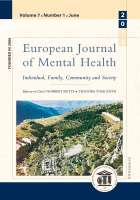The Church’s Work with the Deaf as an Interface between the Church and Society
The Church’s Work with the Deaf as an Interface between the Church and Society
Author(s): Paavo Kettunen, Liisa RantalaSubject(s): Social Sciences
Published by: Semmelweis Egyetem Mentálhigiéné Intézet
Keywords: disability; Marriage Act; oralism; pastoral care of the deaf; racial hygiene; sign language; sterilisation; work with the deaf
Summary/Abstract: In this article, we examine the Church’s work with the deaf in Finland from the beginning of the 1900s to the beginning of the 1980s. We look at the objectives of the Church and of society as well as the position of the deaf throughout different eras using a genetic-historical approach. Two particular issues are connected to the time period in question: racial hygiene and the shift to oralism. At the end of the 1800s, the concept of racial hygiene gained support throughout Europe, leading deafness, among other handicaps, to be categorised as a defective characteristic. Furthermore, there was a change in how people related to sign language. Through oralism, the medium for teaching the deaf changed from signing to the spoken word, and sign language was forbidden. This resulted in a lower level of general knowledge in the deaf population and a weakening of its position in working life. These particular issues caused changes to how people related to deafness. Earlier, the measure of a good citizen was that they could support themselves. In contrast, the demands of good citizenship during this period grew; good citizens were to be healthy, both mentally and physically. They were to be able to communicate through the spoken word; the deaf’s own language was discountenanced. However, sign language lived on in deaf communities. Moreover, the Church’s work with the deaf in Finland was always carried out in sign language. This work was shared between the Church and the state. The main responsibilities of pastors and diaconia workers working with the deaf were their social and pastoral care, as well as spreading the gospel and teaching. The social work being done with the deaf currently is the responsibility of society, while the Church is responsible for spiritual work. The position of the deaf has improved. There have been changes in the church’s work with the deaf as well. The position of the deaf has changed from being a passive receiver of care to an active participant and actor in society.
Journal: European Journal of Mental Health
- Issue Year: 7/2012
- Issue No: 01
- Page Range: 3-23
- Page Count: 20
- Language: English

